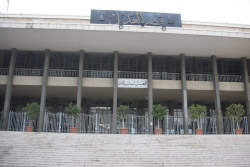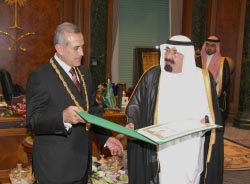Muhamad Mugraby is a Lebanese lawyer, human rights defender and president of the Center for Democracy and the Rule of Law. He wrote this article for THE DAILY STAR.
 By Muhamad Mugraby, There is little doubt that Lebanon has no future as an independent and democratic political entity without the establishment of, and full respect for, the rule of law. The question is: Which rule of law? A rule of law on the legal tradition which Lebanon borrowed from Western Europe, which may be referred to as the "civil rule of law," or a rule of law based on Lebanon’s pre-statehood and original tradition of Islamic law, which could correctly be called the "Islamic rule of law?" The failure of the civil rule of law to take hold would make it inevitable for the Islamic rule of law to take over. Among the most elementary requirements for the civil rule of law which Lebanon had to observe is the development of a body of statutes sanctioned by a legitimate legislature, constitutionally established (i. e. a duly elected parliament). This task has been mostly fulfilled by borrowing and Arabizing text from French law. But so far many other necessary requirements have not been met, such as, by way of illustration:
By Muhamad Mugraby, There is little doubt that Lebanon has no future as an independent and democratic political entity without the establishment of, and full respect for, the rule of law. The question is: Which rule of law? A rule of law on the legal tradition which Lebanon borrowed from Western Europe, which may be referred to as the "civil rule of law," or a rule of law based on Lebanon’s pre-statehood and original tradition of Islamic law, which could correctly be called the "Islamic rule of law?" The failure of the civil rule of law to take hold would make it inevitable for the Islamic rule of law to take over. Among the most elementary requirements for the civil rule of law which Lebanon had to observe is the development of a body of statutes sanctioned by a legitimate legislature, constitutionally established (i. e. a duly elected parliament). This task has been mostly fulfilled by borrowing and Arabizing text from French law. But so far many other necessary requirements have not been met, such as, by way of illustration:
A. The existence of one legitimate constitutional government, recognized by the people as legitimate and sovereign, with all three branches constituted as per the constitution: the executive (Cabinet), the legislative (Parliament) and the judicial (courts of law), governed by law and accountable in accordance with the law with honor and integrity.
B. Equality under the law with no discrimination for reasons such as religion or gender, already provided under Article 7 of the Constitution.
C. Equal application of the law, which requires consistency in interpretation of the rules and in their application to citizens.
D. Respect for human rights, particularly in the prevention of arbitrary detention and all forms of torture, safeguarding the rights of defense and avoidance of denial of justice.
Lebanon’s dismal failure on all these fronts flagrantly and flatly contradicts its subscription, in its statute book, to the West European legal model. Hence, a full and candid diagnosis is urgently called for.
It would not be an exaggeration to recognize that the entire modern political history of the Republic of Lebanon revolves around the open issue of maintaining Maronite Christian political supremacy, or at least parity, vis-
 Lebanese President Michel Sleiman on Monday urged Saudi entrepreneurs to invest in his country during his first visit to oil-rich Saudi Arabia since his election in May. Addressing business leaders at the Jeddah Chamber of Commerce and Industry, Sleiman urged them to "boost their investments" in Lebanon, which offers "guarantees and facilities" for investors, the official Saudi Press Agency (SPA) reported. Lebanon has formed a committee to assess the losses incurred by Saudi investors during the political crisis his country went through in the past few years, Sleiman said, thanking Saudi Arabia for what he described as its constant support for Lebanon. Sleiman, a former commander of the Lebanese Armed Forces, was elected president in May after Lebanon’s rival political factions struck an Arab-brokered deal in the Qatari capital, Doha, to end an 18-month political crisis that had brought the country to the brink of civil war.
Lebanese President Michel Sleiman on Monday urged Saudi entrepreneurs to invest in his country during his first visit to oil-rich Saudi Arabia since his election in May. Addressing business leaders at the Jeddah Chamber of Commerce and Industry, Sleiman urged them to "boost their investments" in Lebanon, which offers "guarantees and facilities" for investors, the official Saudi Press Agency (SPA) reported. Lebanon has formed a committee to assess the losses incurred by Saudi investors during the political crisis his country went through in the past few years, Sleiman said, thanking Saudi Arabia for what he described as its constant support for Lebanon. Sleiman, a former commander of the Lebanese Armed Forces, was elected president in May after Lebanon’s rival political factions struck an Arab-brokered deal in the Qatari capital, Doha, to end an 18-month political crisis that had brought the country to the brink of civil war. 


